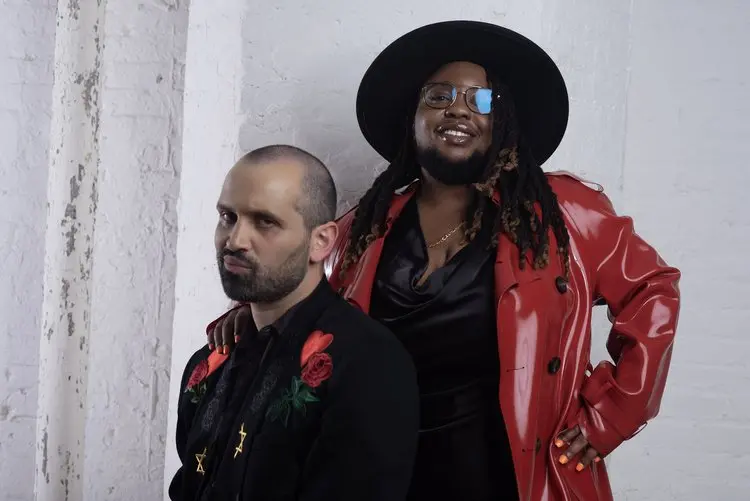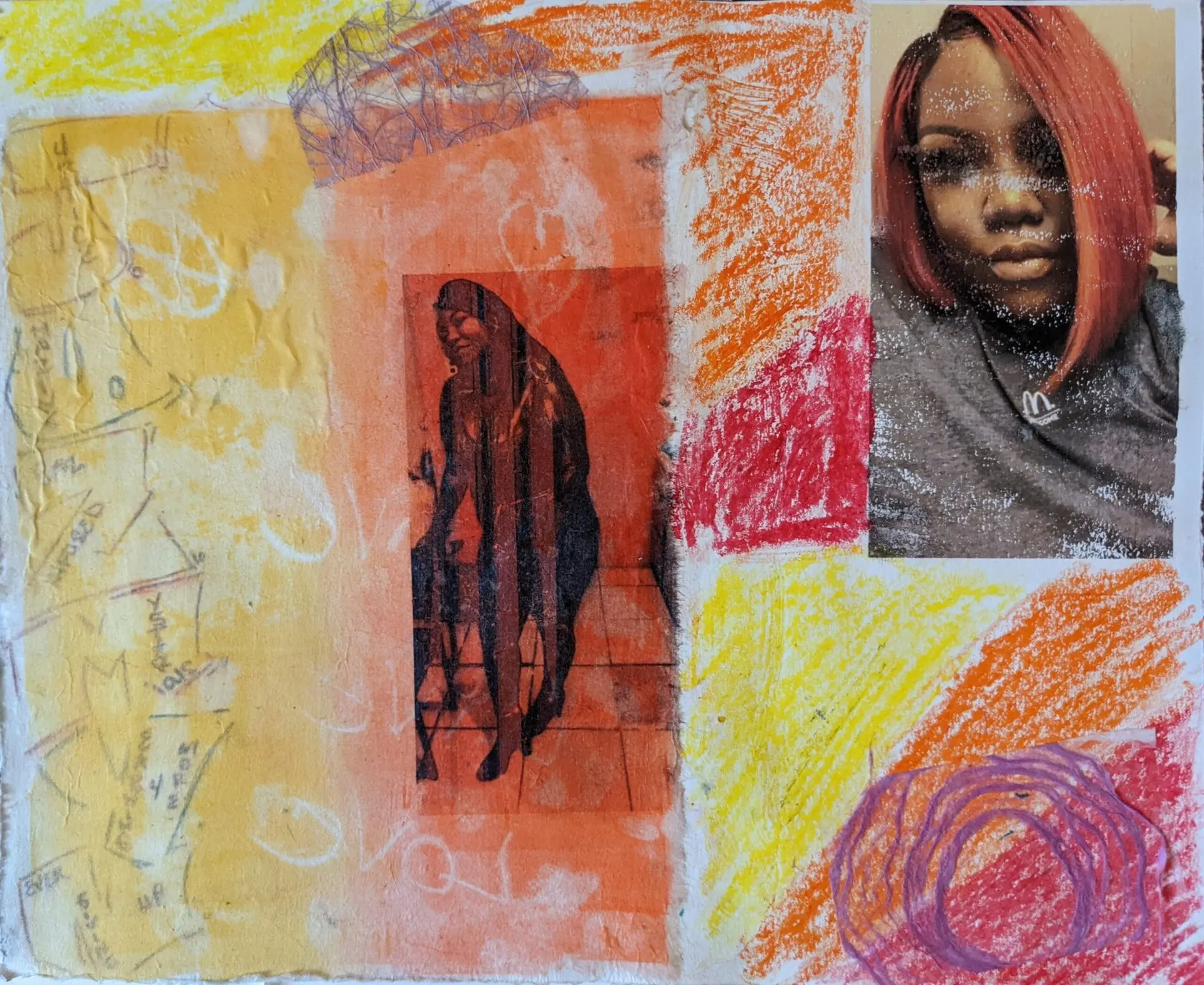David Webb was awarded Honorable Mention in Fiction in the 2021 Prison Writing Contest.
Every year, hundreds of imprisoned people from around the country submit poetry, fiction, nonfiction, and dramatic works to PEN America’s Prison Writing Contest, one of the few outlets of free expression for the country’s incarcerated population.
This piece is also featured in Visiting the Blues, the 2021 Prison Writing Awards Anthology.
No Change in Sight
The boy stood in the door between the living and dining rooms, silently watching the old man, who was for him at nine years, harder than he thought to figure. The boy was solidly built and large for his age. Those he knew, and those he didn’t know as well, became fortune-tellers upon the contemplation of it. He would be “a very big man,” they told him. His size, though, was overshadowed by his brain work, which was impulsive when it was not pensive. He hadn’t been home a half hour, and still wore his school clothes—a blue plaid shirt (that had better stay buttoned to the collar) and a pair of jeans (that were bought with hard-earned money). The majority of this time had been spent spying on the old man—as quiet as a mouse, mind buzzing, trying hard to understand what it was like to be the old man. But the boy just could not imagine how he had managed to live such a life so long. He was older than the president and older than the penny he had from 1913, his grandfather had told him.
Every day, starting around eight when he went to school, until well into the evening, the old man sat at the head of the dining room table, with his bald brown head in his hands, listening to radio shows and smoking cigarettes. Sometimes he would be brought coffee. The boy he sometimes asked to fry him an egg when he returned from school. His dress slacks, shirt, and sweater were as stable as his routine, and only varied in color. On this day, he wore rust-colored slacks and a sweater with a white shirt.
Occasionally, he would laugh. Like he did now. And on the occasion he was near, and found it of interest, the boy would ask what he laughed at. These were the occasions the old man dreaded because the boy never took “no” for an answer. And, only after becoming extremely agitated with himself, for thinking this time things might be different, only then would he give in. The boy was a baby devil, he thought. “I might understand. I know what a joke is. You laughing ’cause it’s a joke, right?” And under this kind of pressure, with this line of reasoning, the old man would have to concede. And in so doing, he would tell the boy, very seriously, something like, “the Republicans are on the right track… …and Reagan vows…” And the boy would bare his teeth, his cheeks would move toward his eyes in an exaggerated manner, and, off key and cue, the boy would laugh his fake laughter.
The old man would then sit there, near the boiling point, and wait for the boy to finish before asking him to leave the room. “Go play,” or “Get the hell out of here,” he would say, depending upon how much he had been moved.
On the occasion he was not interrupted, these things sometimes brought on so much laughter that the old man would wheeze and cough from overexertion, and the radio would have to be turned off.
Things like these made him wonder all the more about the mind of the old man.
He laughed now though, on account of the boy. The boy, he thought, was really turning out to be a sly one.
“Joseph,” he called out.
The boy backed swiftly out of the door, and well into the other room, before he answered, “Yes, sir.”
The old man chuckled, repeating “Yes, sir,” under his breath. He recalled a moment a few years before when, after having a little nip after dinner, he called the boy and, holding him by the wrist, took out his dentures and set them on the table. The boy nearly pulled him from his seat—and his arm out of socket—trying to get away, he recalled. “You better not hit your grandfather,” they told him. He’d cried as hard as everyone laughed, and he wouldn’t come near him for days.
The old man began to wheeze and cough, but between breaths he managed to say, “Come here.”
The boy walked into the room and over to his grandfather. The old man sat like he had been before, with his head in his hands. The room was dim, for the curtains were drawn, and only a small amount of light filtered through them. The air was stale and heavy with the remnant of chain-smoking. The inertia of the old man would have pervaded, if not for the animated voice from the radio, which livened things a little.
“Yes,” the boy said, standing next to his grandfather. Close enough to smell his musty old-man smell.
“Joe,” he said, sounding extremely tired, and so unlike he had a moment before. “I want you to go to the store for me. I need some cigarettes.”
He had yet to move. His hands, heavy knuckled with arthritis, remained against his skull. And now that he finished talking, his torso swelled and shrunk with good breathing, as if he had fallen asleep. Joseph looked across the table at a newly opened pack of Pall Malls, on top of another unopened one next to the radio. To be sure, he moved closer to his grandfather and reached across the table, then touched the pack and pushed down on it.
“What you doing, boy?”
“Nothing,” Joseph said, and after a pause, he asked, “You sure you don’t want a soda?”
The old man removed one of his hands from his head to bang the table.
“Goddamn it, boy, if you want the extra 15 cents, just ask me. I’ll give it to you,” he said. “I don’t want no goddamn soda. Now you gonna go to the store for me or not?”
“I’m going,” the boy said.
He knew better than to deny wanting the 15 cents; that he wouldn’t ask for, for to deny would mean that he was in double trouble, for lying and sassing.
“Okay then,” the old man said. “Let me get my money. I got to get my money, Joe.”
In a mechanical manner, he moved his legs from out under the table, and turned to face Joseph. Though he was thin, his knees were cinched in his slacks and protruded like two very large fists.
“I got to get my money, Joe,” he repeated, lifting the hem of his sweater to get in his pocket. “You see that there, Joe? Hunh?” he asked, after peeling back several large bills from the fold.
And Joseph, with his customary oohs and aahs said, “Yeeaah. Ralph, you rich.”
This never failed to tickle the old man. The absurdity made him giddy.
“Hanh hanh. You like money, don’t you, Joe?”
“Yeah.”
“You keep going to school and learnin, you’ll have money just like this. Probably more. Cause you smart. Smarter than when I was your age. Now, what’s that?”
“That’s a twenty,” Joseph answered.
The old man peeled back a couple more bills and repeated his question.
“That’s a ten,” Joseph answered.
“And that?”
“That’s a five,” Joseph told him.
“What? I said what’s that?” the old man asked, after dividing the straightened bills from the ones he’d stopped on and pushing them near the boy’s face, before repeating his question again.
“That’s a five, Ralph. It’s a five.”
“Okay,” the old man said, peeling back several more bills, until he came upon the ones, and asked, “What’s that?”
“That’s a one, Ralph.”
When Joseph returned, he saw that his aunt was home from work, and that she and his grandfather went back and forth about something, which made him nervous, and upset his stomach, so that he felt like he had to use the bathroom. He tried to stay in the next room until it was over. That’s what he planned, but he was called into the dining room by his aunt—who his grandfather repeatedly called a girl though she was almost forty—and told to shut up.
His aunt stood next to his grandfather, with a cold drink in one hand and the shoulder of the old man in the other.
The woman was tall with thin arms and thick legs. She wore a gray skirt and dark stockings, a cream-colored blouse, and a black department store vest, with her name on a white tag over her breast. She finished her drink and the ice clinked in the glass when she drained it.
The old man, acknowledging Joseph’s presence, patted the hand on his shoulder and said,
“Leave him be. Let the boy alone, girl.”
The woman shifted her weight to one foot. The hand that had held the glass was now in the small of her back, behind the hip which swelled in her skirt. And as if encouraged by being told not to bother the boy, she said to him,
“Put your grandfather’s change on the table.”
Joseph looked at his grandfather, who said nothing, and didn’t even look in his direction. Then he did as he was told.
“You got any money?” she asked.
“No.”
“Here,” she said, handing him a dollar. “Go get me some cigarettes.”
“Winstons, right?”
“Boy, you know what kind of cigarettes I smoke.”
Up to this point, the woman’s face had been impassive. Now she wore a smile. And Joseph returned it, quizzically.
“Boy, you too grown. Hurry up and go get my cigarettes. And bring back the change.”
“I can’t have the change?”
“No,” she said, as if it were foolish for him to ask. “Now go.”
When Joseph returned, he saw that his mom was home, and she and his aunt went back and forth about something, which made him nervous, and upset his stomach…
His mom had thrown her hand up in his aunt’s direction—sort of like a crossing guard does to stop traffic. And she looked in his, with a look that was familiar, and said,
“Come here.”
Joseph passed his aunt her cigarettes and change, and said it was in the bag when she asked for it again. Then he went to his mom and tried to hug her. Like he did whenever she came from work, or he wanted to get on her good side. But she held him off.
Joseph’s mom was in her mid-twenties. She was tall like her sister. But she was much thinner and prettier, in a white nurse’s dress, stockings and shoes. She wore a perm, and it fell, dark and glossy, like one large bang around her head, like a mushroom.
“Yes,” Joseph said, trying to sound and act innocent, and to divert what was coming.
“Pull your pockets out,” she told him. And after he’d done so, she slapped his face, and asked, “Where’s your grandfather’s money?”
Though it wasn’t a very hard slap, it was very humiliating. And it showed him he couldn’t think as well as he’d like to—made him wonder why he couldn’t stay out of trouble.
“I gave it to him already,” Joseph said. “Ask him.”
Joseph looked at his grandfather, who said nothing, and didn’t even look in his direction. He had slouched deeper into his posture. So that his head rested on his forearms, and his hands at the back of his neck.
“When did you give it to him?” his mom asked, and, before he could answer, she told him he was lying.
“No,” Joseph said, taking a step backward, before adding, “when I came from the store.”
“Don’t lie, Joe,” the old man cut in, sounding as tired as he had ever been in life. “Don’t lie to your mother, Joseph. Tell her the truth.”
Joseph couldn’t believe what he was hearing. He thought for sure his grandfather would stand up for him; tell his mother not to do that again. Like he had before, for his little buddy. But the old man did nothing like that. And before long, they had all agreed that he should go back out and see if he could find it, in addition to making sure he brought his mother back a pack of cigarettes. During this time, he had looked from one face to the other, searchingly, and knew that they were without true knowledge. He knew that they didn’t know. This made something inside of him laugh, though you wouldn’t have been able to tell by his face, which still stung with humiliation. He was thinking that even though he had never met a crazy person, he was certain that something was not right with his grandfather. He was sure he was not all there. And while under the influence of these thoughts, he looked into the faces of his aunt and mother and, hesitantly, pointed at his grandfather, wondering was he what meant responsible. And he began thinking something other about his aunt and mother, while trying to find the ability to articulate this. Which wasn’t a complete failure, for as if the women had read his mind, his aunt began saying, “unh, unh, unh,” and his mother tried to strike him again before he ran out of the house.
When Joseph returned from the store with his mother’s cigarettes, he saw clear into the other room—where she stood with his aunt eyeing him as he came through the door—that her eyes watered at the sight of what he held in his hand. But she didn’t cry.
Instead, she wiped her hands on her apron and went back into the kitchen, after telling the boy to put the cigarettes on the table and hurry upstairs. He was called down for dinner and ate alone in the kitchen. The call, sounding seemingly to catch him in the act of something else, had come not long after he was sent to his room on the third floor, next to his grandfather’s. Where he stopped off before going into his own; where he’d moved to the old man’s bed and held up a pillow, that he punched repeatedly, while imagining it as the old man’s midsection, until he felt like what he did was wrong—unsatisfactory, rather—and he moved back in the direction he’d come, went into the closet next to the door where he’d entered, and repeated the punching and imagining with one of the old man’s sweaters. Until he broke the hanger from which it hung and became scared, after it fell on the floor of the dusty closet and the dirt smeared when he tried to wipe it away. So there was nothing for him to do but wrap the broken hanger in the dirty sweater and hide them both in the back of the closet behind some shoeboxes. Then he went in his room and laid down and stared at the ceiling, thinking about what went wrong with the missing money. While the tears that burned his eyes with shame and betrayal grew cold as they rolled down into his ears and made his mother sound funny calling out to him.
After he had eaten, Joseph was sent to his room and ordered not to leave it, for anything; but, whenever he heard a stir downstairs, he would go down to the second floor, to the bathroom, to see if his cousin Benjamin had returned home yet. He did this several times, bathed, and was awoken from sleep when his cousin finally came in.
Joseph got up to go down and see him. Before going down, he stood on the small landing outside their rooms. A space in the floor whined when he went to peek into his grandfather’s. It appeared the old man hadn’t heard it. He seemed to be absorbed in another of his radio programs. He was sitting up with the covers drawn around his waist, staring straight ahead—wild-eyed and listening so intently one would believe he had trouble hearing. A ribbon of smoke, as tall as his torso, rose from the cigarette he held in the tray on his lap, with an ash at least an inch long bent on the end of it. The stream was flattened by an invisible barrier just above his head, and came back down and shrouded the old man in mystery.
The boy turned away and was about to go downstairs when the old man called him. His anger had returned. He had been thinking about doing something malicious, like telling someone the old man was smoking in bed. But he wasn’t no snitch.
“Hey,” the old man repeated in a disgruntled fashion. “Come here, boy,” he said. “What you doing out there? Hunh? Sneaking around? Didn’t your mother tell you not to leave your room?”
Joseph pushed the door open and stepped inside. He watched him stub out the cigarette and place the tray on the nightstand next to the bed.
“I’m going to the bathroom, Ralph,” he said. “I had to make sure you put that cigarette out before I went downstairs. My mother told me to watch you when you smoke. She said she scared you going to burn us up.”
“Your mother said that, hunh? Well, since you going to the bathroom, dump this for me.”
Joseph figured he meant the ashtray, since he hadn’t indicated anything. But, as far as he could see, the ashtray wasn’t full.
“You don’t want me to dump the ashes in your trashcan cause it might start a fire, right?”
“What? Come over here, boy. Reach under there and get that jar.”
“Where…. What’s in it?” Joseph asked, as he reached under the bed to retrieve the jar. “Eww,” he said, “I ain’t touching that.”
“Boy, reach under there and pick that goddamn jar back up. You want money, don’t you? Hmph. You don’t get in no shit the rest of the week, I might treat you to the movies.”
Someone was climbing the stairs. Joseph prayed it was not his mother.
It was the old man’s other grandson, his cousin Benjamin. He wore dark blue jeans and a blue velour V-neck, with a pair of soft-bottomed shoes. Clarks. He was tall, with a medium build. A playboy figure, ”taking after the old man,” the grandfather assured him.
“He don’t want to get that for you, Ralph? I got it,” he said, kneeling and reaching for the jar that rolled under the bed.
Joseph left the room and waited on the stairs. He didn’t want his grandfather continuing to try and force him to take the jar. He thought he may have, even after his cousin volunteered. He heard the old man tell his cousin to get his pants off the chair so he could give him something. He refused. But the old man insisted. Shortly afterward, Joseph saw him emerge through the light that came onto the landing from the old man’s room. He descended the rest of the stairs and waited at the bottom, where he barred his way.
“Boy, you a punk,” Joseph said to him.
The bigger boy laughed and said,
“Stop playing.”
No sooner than he’d mouthed the words, Joseph stepped forward and punched him as hard as he could. He told him to shut up and continued throwing punches at him while he went to set the jar down. They went to the body—both being hit harder than usual. He was almost twice Joseph’s age, and even with the mistaken slips, he knew that Joseph couldn’t keep up with him. And because he knew he wouldn’t quit, he told Joseph he was tired and asked him to let him empty the jar.
Joseph had rubbed his sore wrists as he trailed his cousin into the bathroom. Benjamin pulled the string that hung from the high ceiling and the bathroom was flooded with light. He lifted the toilet seat, unscrewed the lid, and emptied the jar. He filled the jar with water from the tub faucet, emptied it, and rinsed the outside. Then he sat the jar down by the door, where Joseph stood looking like he would try him again.
Benjamin looked on as Joseph unbuttoned the top of his pajamas and rolled up one of his sleeves. He listened as Joseph told him how many times he’d been to the store without being paid; and about how they wouldn’t let him back into the house without the money or cigarettes. He listened to him talk about his mother. Then he listened to him talk about his own mother.
Benjamin listened to it all without interrupting. When the boy was silent, he stared at him, as if it were something more; but Joseph had finished. And so, curiosity having a hold, he asked Joseph, “Well, how did you get your mother’s cigarettes?”
“I told Wong what happened. And that if he didn’t give me a pack of cigarettes for my mother, I wasn’t never coming in that store again. Not unless Iron Fist or one of the Drunken Masters was in there.”
They both laughed.
“Better not lie. Better not lie,” Joseph said, imitating the Asian man.
They laughed again. The older boy told Joseph to calm down before one of their mothers came into the room.
They were silent awhile. Then Benjamin asked Joseph, “What happened with Linda Green today? Did you see her?”
“I saw her. And I told her how pretty she was and everything. And she told me that I didn’t love her. And that she was going to tell her father if I didn’t leave her alone.”
“Yeah?”
“Yeah.”
Benjamin stood to remove the money he’d gotten from his grandfather. He gave the boy a dollar bill. Buy her some Butter Crunch tomorrow, he suggested. I don’t know, girls in the fourth grade is different from the ones in the eleventh. My girls is women.
“Linda Green a woman,” Joseph argued.
The older boy left it at that. He grabbed Joseph around the neck. He rubbed his head, and told him, “Go on up to bed. And say good night to Ralph. He think you mad at him.”
Joseph left the room after trying to take another of his cousin’s cigarettes. Which he was refused. He did as he was told, starting with washing his mouth out with Listerine. Then he climbed the stairs and stepped inside his grandfather’s room. “Ralph, I love you. I love you, grandpop,” he told the old man.
The old man bared his gums, his cheeks moving toward his eyes in an exaggerated manner—until they trembled, and were quickly followed by the backs of his hands. And as quickly, he composed himself.
“Come here, boy. Give your grandfather a hug.”
“I’m getting ready to go to bed, Ralph. I see you tomorrow.”
“Come here, boy!” the old man said, raising his voice.
“No!” said the boy, doing the same.
Then they heard the slippers sliding over the steps as Joseph’s mom climbed the stairs. Joseph, in a whisper, pleaded with his grandfather to save him from her. The woman had yet to enter, but she was already asking the boy why he refused to listen to her. When she had, the old man simply told her not to bother his little buddy. He was having a talk with the boy.
“Nothing had changed between them,” he said.









